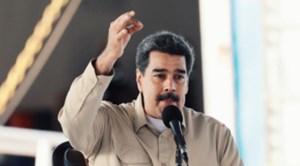Maduro consolidates power with new Venezuelan National Assembly
(Bloomberg) --Venezuelan President Nicolas Maduro installed a new National Assembly filled with regime loyalists, consolidating his power over key institutions in the crisis-torn nation despite mounting U.S. sanctions.
Carrying pictures of the late Venezuelan leader Hugo Chavez, lawmakers on Tuesday elected former Information Minister Jorge Rodriguez as the new president of the legislative body. Maduro’s son Nicolas Maduro Guerra and his wife Cilia Flores were among the 277 representatives who took their seats -- in their vast majority supporters of the ruling socialist party, following December elections the opposition has denounced as fraudulent.
“Sanctions are useless, because the people have shown that not even the worst sanctions will be able to break them,” Rodriguez said after being sworn in, assuring that the Assembly will promote dialogue with all political groups, including those that boycotted the election.
Since taking over for Chavez in 2013, Maduro has resisted efforts to force him out, presiding over a precipitous deterioration of the oil-rich country. The U.S. and more than 50 countries recognized the opposition’s Juan Guaido as interim leader in early 2019, when he took the helm of the previous National Assembly controlled by Maduro opponents. His claim was based on alleged vacancy in the presidency due to elections deemed fraudulent in 2018.
While Guaido retains international support publicly, his stance has gradually weakened as the showdown with Maduro drags on and as more opposition politicians are forced into exile, jailed or legally sidelined. In a sign of just how limited his powers are, Paraguay said on Tuesday that President Mario Abdo Benitez has rejected an offer made by a Guaido envoy to settle debt with oil producer PDVSA at a deep discount because the country can’t be sure it would be paying the “legitimate creditor.”
Competing Assembly
After boycotting the National Assembly election in December, Guaido insists that he is the democratic leader of Venezuela and installed a competing legislative body on Tuesday during a small ceremony, in an unknown place to avoid repression by police or Maduro supporters. It’s unknown how many lawmakers participated in the session that ratified him as head of Parliament and “interim president” of the country. Most of them attended virtually.
“We are standing here because we are not going to succumb to the threats and terror of the dictatorship,” Guaido said during the webcast ceremony. “Here is Parliament defending Venezuelans, the constitution and the right to be free. The dictatorship intends to destroy the democratic alternative.”
Yet Guaido is facing a wave of high-profile defections from his group of allies, including the Assembly’s former Vice President Stalin Gonzalez, who characterized his strategy as “foreign to the country’s reality.”
Seeking Investment
In a televised speech last month, Maduro promised to respond “fiercely” and “according to justice” to the opposition’s decision to continue meeting. On Monday, the U.S. Treasury granted a license that recognized Guaido’s assembly and its decisions as legitimate.
With the new assembly, Maduro will try to attract foreign investment, something the government has tried to do via its anti-blockade law, Eurasia Group analysts Risa Grais-Targow and Laura Duarte wrote in a note. “However, such proposals are unlikely to have meaningful impact given aggressive sanctions and a limited universe of firms willing to deepen ties with the government.”
Attention now turns to whether Guaido’s international backers, from U.S. President-elect Joe Biden to European Union leaders, will continue to recognize him as Venezuela’s interim president.



